By: Ali Farkhan Tsani, Dai of the Al-Fatah Islamic Boarding School Cileungsi, Bogor, Journalist at the MINA Islamic News Agency (MINA)
Among the pillars of civilization is the principle of respect for science. A scientific revolution capable of rejecting heresy, baseless prejudice, superstition and sleaze. A scientific spirit that gives birth to a spirit of long life education as well as extensive research and development in various scientific disciplines.
That is the spirit of “Iqra”, the verse Allah first revealed to humans through the Prophet Muhammad Shalallahu alaihi wasallam. The spirit of learning, the spirit of studying, the spirit of research, the spirit of developing knowledge.
The superiority of the knowledge of the Islamic world, which began with the command to read (iqra’) in the widest possible meaning, eventually gave rise to an amazing world civilization that can overshadow the entire surface of the earth by bringing prosperity, goodness, and progress to the people and nation.
Also Read: The Forty-Four-Days of Glory: Azerbaijan’s Struggle for Justice and Peace
Excellence in exploring knowledge is developed by educational institutions at that time in various regions. From the very beginning of the arrival and spread of Islam it was, the call for learning was very strong. Places for learning continued to grow, starting from a place called Shuffah in the foyer of the Prophet’s Mosque during the time of the Prophet Muhammad Shalallahu alaihi wasallam. Then, it continued to develop during the Friends, Kingdom (Mulkan) era and so on, including in the form of Kuttab and Madrasahs.
Kuttab teaching center according to Prof. Dr. Raghib As-Sirjani, is considered the oldest educational institution among Muslims. The position of Kuttab in the first century of Hijriyah is a priority that is of great concern. The main objectives of teaching in Kuttab are memorizing the Quran, Islamic religious knowledge and learning to read and write.
Kuttab expanded to the East in the Indian Peninsula, Central Asia, Iran and the Middle East. Then to the African region to Andalusia (Spain). Furthermore, many madrasah or school educational institutions developed, especially in Damascus (Syria), Baghdad (Iraq), and Cairo (Egypt).
As for Islamic teaching and development institutions in Indonesia, they develop through the oldest Islamic educational institutions in the form of Islamic boarding schools.
Also Read: Palestine Solidarity Month: A Collective Movement for Al-Aqsa and Palestine’s Freedom
Presence of Islamic Boarding Schools
In the Indonesian context, history has recorded in golden ink that Islamic boarding schools are the oldest Islamic educational institutions in Indonesia. Its existence has a very important role, starting from the period of the struggle against colonialism, achieving independence from colonialism, maintaining the integrity of the Unitary State of the Republic of Indonesia (NKRI), to filling it with development in various fields of life. Even if traced back, Islamic boarding schools in Indonesia have a very large role, both for the development of Islamic da’wah and for the journey of the Indonesian nation as a whole.
As part of the civilization of the Malay Archipelago for centuries, the current pesantren tradition is an educational institution that has strong social and religious networks between its institutions throughout the province. The strong network is dynamic and supports each other. (Islamic Boarding School Tradition Study of Kyai’s View of Life and His Vision Regarding Indonesia’s Future. 2019. p. 278).
The presence of Islamic boarding schools in Indonesia from the past until now has not only produced students who have knowledge of the Islamic religion and its social missionary role. However, it is also capable of creating intellectually intelligent human beings, forming religious, pious, ethical, and aesthetic human beings, and being able to keep abreast of societal developments.
Also Read: Hassan al-Turabi: A Controversial Thinker from Sudan
Islamic boarding schools have also developed to participate in teaching skills and independence, so that their students can become complete human beings who are useful to society, nation and religion.
From this, one can see how the graduates of Islamic boarding schools are a reflection of the future of Indonesian civilization as a future virtuous civilization, whose level of excellence is able to compete with other world civilizations. In this case, Islamic boarding schools have the potential, opportunity and competence to produce generations of national civilization.
Related to this, the quality of the Indonesian people to support the nation’s civilization can be grown by and in quality educational institutions, in all types and levels. One way is by empowering the strengths of educational institutions developed by the community itself, namely Islamic boarding schools.
Islamic boarding schools are Islamic educational institutions that are so important in managing the nation’s civilization, bearing in mind that they do not only enrich the minds of students with explanations of the Islamic religion. But it also puts forward moral values, humanity, independence, tenacity and simplicity, which became the spirit of Islamic civilization in the world at its heyday.
Also Read: Who Exactly is the RSF Group Shaking Sudan?
The values of this Islamic boarding school are known as the “Panca Jiwa Pesantren” (Five Souls of Islamic Boarding Schools), which consist of: sincerity, simplicity, independence, ukhuwwah Islamiyyah, and freedom.
In the view of Ahmad Muthohar AR, who has studied at the Fathul Huda Islamic Boarding School in Demak, Central Java, it is from Islamic boarding schools that Muslim personalities can be developed, namely personalities who fear Allah, have noble character, are useful and serve society, are able to stand alone, free, firm. In personality, spreading and upholding the religion of Islam and the glory of Muslims. (Islamic Boarding School Education Ideology in the Middle of Educational Ideology Currents. 2007. p. 92).
Ahmad Muthohar added, it is through Islamic boarding school education that students acquire life values that originate from the universality of Islamic teachings. The values of this universality are then contextually adapted to the social reality of society. Thus the values developed in Islamic boarding schools are not only ukhrawi oriented, but also worldly orientation, which cannot be separated from ukhrawi values.
This is in line with Law no. 20 of 2003 concerning the National Education System, which in Article 3 states that the purpose of national education is to develop the potential of students to become human beings who believe and fear God Almighty, have noble character, are healthy, knowledgeable, capable, creative, independent, and become citizens. democratic and responsible state.
Also Read: The Two-State Solution (Palestine–Israel) in Historical Perspective
Santri who have noble character, are useful and serve the community, means that from them the next generation will emerge candidates for leaders of the people, society and the nation who have the excellence of noble character, have a high work ethic, are not trapped in a culture of corruption, are honest and fair, and provide benefits to as much as possible to society.
This is because the students are used to the culture of gotong royong and cleaning up the environment (good deeds), for example, they also get along well with neighbors at joint events. At the same time, all of this is a form of community service (khadimul ummah) which plays a role in improving the social spirit and leadership of the students.
In line with that, it is also stated in Indonesian Law Number 18 of 2019 concerning Islamic Boarding Schools. Mentioned in Article 3, Islamic Boarding Schools are held with the aim of:
forming superior individuals in various fields who understand and practice the values of the teaching his/her religion and/or become a religious expert who is faithful, pious, has a noble character, is knowledgeable, independent, helpful, balanced and moderate;
Also Read: Enchanted by K-Dramas, Dragged into Slander: Time for Muslims to Rise!
Forming a moderate understanding of religion and diversity and love for the motherland as well as forming behavior that encourages the creation of religious harmony; and improve the quality of life of people who are empowered to meet the educational needs of citizens and social welfare of the community.
Furthermore, national education which functions to develop capabilities and shape dignified national character and civilization, will be much more easily achieved by students who have been educated with good habits and communities while studying at Islamic boarding schools. Here it appears that the role of Islamic boarding schools is very real in the formation of this character.
This is character education (character building) that is needed by society, the nation, and even the world. Citing the views of Prof. Dr. Zainuddin Maliki, M.Sc. who said that in the world of education, human beings with character are the outcomes to be realized. (Upgrading the Quality of Education A Thought Offer. 2021).
This character education is developed in such a way as to enable students, in this case the santri, to be actively involved in the entire educational process, both mentally and physically. This pattern is carried out with interactive learning that focuses on optimizing the ability to achieve student achievement.
Also Read: Creating Opportunity and Avoiding Misery; Lesson Learn on Waste Recycling Issue
Prof. Zainuddin Maliki added, the formation of character education is characterized by creative activities, among others in terms of: developing an ethos of the spirit of pursuing achievement, increasing high quality leadership, developing cooperation with the community and various agents of change, oriented to the values of community empowerment, being able to work professionally and involves parental responsibility.
So, it is right to say that studying at Islamic boarding schools has two advantages. In addition to receiving religious lessons, students at Islamic boarding schools also receive general lessons. Both of which underpin character education.
Knowledge can indeed lead people to success. However, knowledge and strong personality will produce strong and superior human beings. That is the advantage of education in Islamic boarding schools.
With the formulation of education that functions as a medium for the formation of character or character, then sociologically education will be able to give birth to human resources with dignity. Therefore, as a generational cadre institution, Islamic boarding schools are training places for students so that they can become human resources with superior character who are able to stand alone and develop themselves so that they do not depend on others, except for Allah, ie full trust in Allah after maximum effort.
Also Read: Between the Treaty of Hudaybiyyah and Ceasefire in Gaza
Because of this, the kyai, caretakers of Islamic boarding schools, strongly recommend dhikr which is very well known, and is widely practiced as one of the daily wirds, namely:
حَسْبُنَا ٱللَّهُ وَنِعْمَ ٱلْوَكِيلُ
Meaning: “Sufficient is Allah to be our Helper and Allah is the best Protector”. (QS Ali Imran / 3: 173).
The recitation of this dhikr is usually followed by the sentence:
نِعْمَ الْمَوْلَى وَنِعْمَ النَّصِير
Meaning: “He is the best protector and the best helper.” (QS Al-Anfal/8: 40).
Also Read: Peace Cannot Be Achieved Without a Palestinian State
This is the remembrance of “Hasbunallah Wani’mal Vice” which emphasizes the spirit of monotheism in believers. Namely that only to Allah alone is the place to surrender, depend and put your trust. Therefore, independence proclaimed by Islamic boarding schools cannot be separated from independence in God’s help.
So with all its dynamics, Islamic boarding schools are increasingly seen as institutions that are the center of societal changes through tarbiyah and Islamic da’wah activities as well as social activities. (T/RE1)
Mi’raj News Agency (MINA)
Also Read: Facing the Wall: Netanyahu and Ambitions Built on Blood






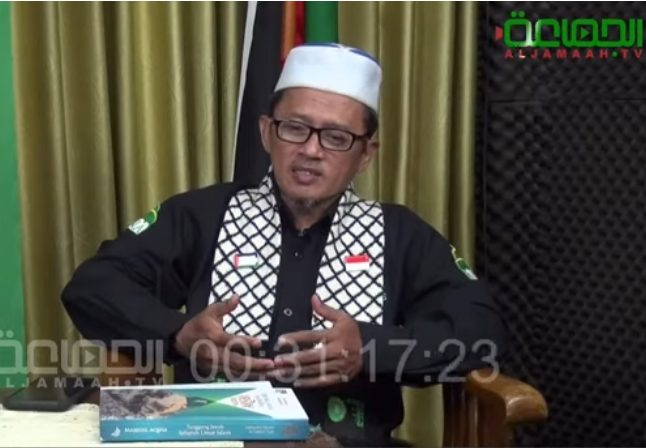



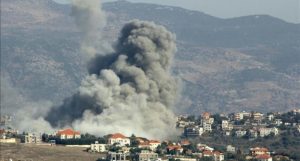





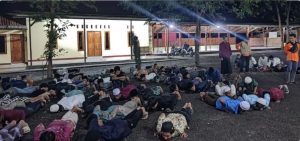
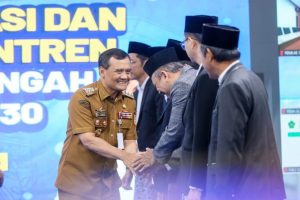
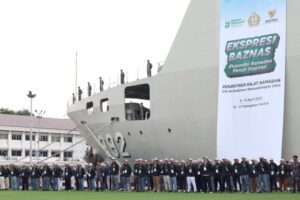
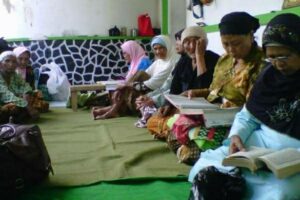
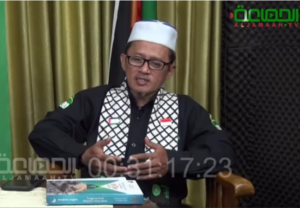
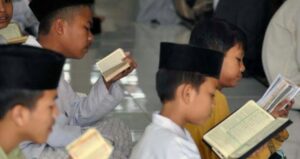












 Mina Indonesia
Mina Indonesia Mina Arabic
Mina Arabic